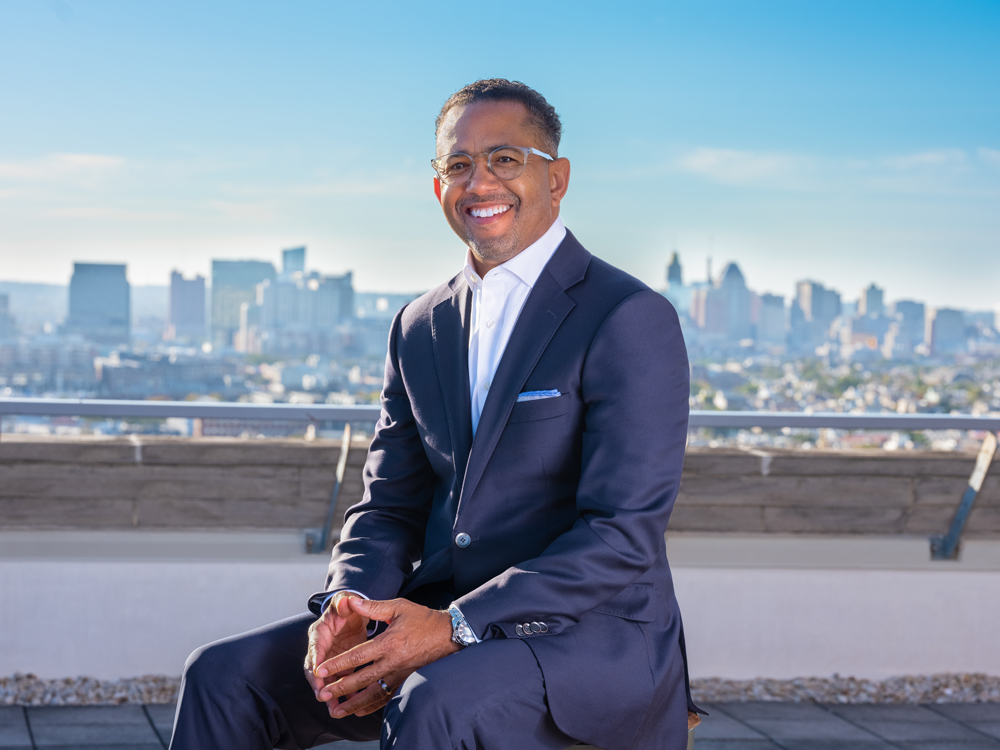I had the distinct pleasure of interviewing Al Hutchinson.
Al Hutchinson joined Visit Baltimore as president and CEO in November 2016. As the chief executive of the city’s official destination sales and marketing organization, he is responsible for overseeing the promotion of Baltimore to leisure travelers and convention business, while demonstrating the impact of tourism on the city and state.
Hutchinson boasts more than 27 years of experience in the destination marketing industry and has earned recognition for his leadership throughout his career. Most recently, he was recognized as one of the Daily Record’s 2019 Most Admired CEOs in Maryland.
Hutchinson is a Richmond, Virginia native and proud University of Alabama alumni. Alongside his wife Unae, he is the proud father of Asia and Jalen Hutchinson. Outside of work, Hutchinson enjoys listening to jazz music and rooting for the Alabama Crimson Tide.
Thank you so much for doing this with us! Can you tell us a story about what brought you to this specific career path?
Thank you for having me! I did not have a traditional entree into the hospitality world via training in a hotel or working in a restaurant like so many folks in my field. I had been working in the financial services industry in the early 1990’s when we were hit by an economic crisis, which was the catalyst to my seeking out new opportunities. This led me to answer a blind newspaper advertisement in the Richmond, VA area, which had been vaguely labeled as a sales role. I had nearly 10 years of sales experience at that point, so I inquired and learned it was a unique opportunity to work in sales for the city of Richmond, where I grew up. That opened my eyes to the world of hospitality and I could hardly believe that having the opportunity to sell my hometown was even a job option. It felt like a natural fit and was a relatively easy transition given my skill set. I got the job at Richmond Region Tourism and have never looked back.
Can you share the most interesting story that happened to you since you began your career?
As I worked my way up into management roles in the destination marketing organization (DMO) space, I was hungry for growth opportunities and professional development. After a number of years, I had my sights set on stepping into a President and CEO role. I was working as the Vice President of Sales for the Virginia Beach Convention and Visitors Bureau at the time and couldn’t see a clear path for continued growth there, so I began to look outside of the organization for new jobs. I was fortunate to have gotten the opportunity to join the team at Visit Mobile as President and CEO. My dream to lead an organization in the DMO space had come true, but my wife and I had two children in high school at that time and we didn’t feel it was best to move them around to a different city, state, and school. It was an interesting time, as my family stayed back in Virginia Beach and I moved to Mobile, AL to pursue my new role. I commuted back and forth for two and a half years, which I still consider the most challenging part of my 27-year hospitality career thus far, but we made it work. My family’s unwavering support helped to open up new doors for my professional development and afforded me the opportunity to not only grow myself, but to also help the Mobile community achieve their goals, all of which I am so grateful for.
Can you share a story about the funniest mistake you made when you were first starting? Can you tell us what lesson you learned from that?
It was not funny at the time, but I can look back and laugh a bit now. In one of my first management roles as a Director of Sales at Visit Pittsburgh, I had been in a meeting with two of my bosses and a very important hotel General Manager to discuss some challenges regarding the city’s lack of business growth at the time. The GM made an unfavorable comment about the work we were attempting to do and I quickly responded with a verbal jab, without thinking clearly through the situation. Part of me felt relieved, like I had just gotten something big off my chest, but after the meeting, my bosses were not pleased with the way I had reacted. They offered me an important critical assessment and taught me the importance of listening and never making personal attacks, which was a professional life lesson I needed to learn. I now know that no matter how one feels about a situation, a person, or an outcome, it is vital to keep the bigger picture goal in perspective and always be the bigger person. This was one of the best and most eye opening lessons I learned on the job in the early stages of management, and I have found that as I’ve become more seasoned in my work, I’ve grown to be more patient and deliberate. When you’re young and trying hard to be effective and successful, sometimes you make quick judgments, but just like athletes as they gain more experience, you slow down a bit and become more intentional with time.
Can you share three reasons with our readers about why it’s really important for a business to have a diverse executive team?
- If you don’t have a diverse representation in the room, chances are that you won’t arrive at the best and most thought out ideas; not only that, but it’s nearly impossible to foster an equitable and inclusive organization. It all comes back to giving diverse leaders a seat at the table so that different voices can be heard.
- With a diverse executive team in place, organizational leaders can raise issues around diversity, equity and inclusion and commit to solving them for the long-term. And for this to happen, we need white industry leaders to step up as allies. Black leadership can’t do this alone; we need support to make positive and lasting change.
- We need diverse leaders in the room in order to nurture cultural change in corporate America, from employee recruitment and retention to strategic planning; and in both corporate and nonprofit spaces, diverse teams can help organizations address and assess how they are engaging underserved or underrepresented communities.
More broadly can you describe how this can have an effect on our culture?
Our culture has a very short attention span and, unfortunately, those who have not experienced structural racism themselves are more likely to see diversity and inclusion as a trend rather than a commitment. We need diverse leaders in the room to keep this mission moving forward.
Can you recommend three things the community/society/the industry can do help address the root of the diversity issues in executive leadership?
- Make sure there is representation on your board.
- Offer diversity and inclusion trainings for your staff. We’ve recently offered these to our hospitality community and the response has been incredible.
- Review your strategic plans, mission statements and core values, and make the necessary changes to ensure strong commitments to social justice.
How do you define “Leadership”? Can you explain what you mean or give an example?
I strongly believe that leadership, at its core, comes from the heart. It is the ability to make your team feel like they are an important part of your overall vision for the company or organization. This atmosphere where folks feel valued and understand the bold vision you have for the business is where the magic happens, in my experience. Great leadership fosters an environment where people feel connected and empowered to speak up and share their input. This has always been the kind of organization I aspired to be a part of, so I feel strongly about embracing intentional, values-driven culture; I practice it every day at Visit Baltimore.
What are your “5 things I wish someone told me when I first started” and why. Please share a story or example for each.
- Talk less
- Listen more
- Be curious — Ask why
- Attract people smarter than me — Part of being a good leader is figuring out if you can also produce other great leaders. I am proud that several people who have worked for me over the years are currently either running their own DMOs or serving in senior leadership roles within their organizations. At the end of the day, your ability to help grow future leaders is what will determine your overall success as a leader. I know that I am not wholly responsible for their success, but I feel fulfilled knowing that I hopefully helped them grow along the way.
- Attract people that care
You are a person of enormous influence. If you could inspire a movement that would bring the most amount of good to the most amount of people, what would that be? You never know what your idea can trigger. 🙂
I would change the paradigm and prioritize education for all. I believe education is one of the most important things we can offer young people, so in an ideal world, I would like to change policy in order to provide more resources for K-12 education. This would also mean increasing the salaries of our teachers and educators in this space. If we were able to invest in top notch education in every county and neighborhood in this country, it wouldn’t matter as much where you live because we could all take comfort in knowing that our local school systems would offer the very best. I feel this would truly make a big difference in where we are going globally.
Can you please give us your favorite “Life Lesson Quote”? Can you share how that was relevant to you in your life?
“People don’t care how much you know until they know how much you care.” To me, life is all about relationships and connecting with people on a genuine level. In my own life, I’ve found that I connect best with people who have a caring heart and work to bring about positivity. I value the power of building relationships and think it’s vital to our overall growth both personally and professionally. If we connect with the heart first and the head second as we go through life, people will see and feel that from you in everything you do.
Is there a person in the world, or in the US whom you would love to have a private breakfast or lunch with, and why? He or she might just see this, especially if we tag them. 🙂
I would love to meet with the great Dr. Martin Luther King Jr. over a cup of coffee or breakfast. He was assassinated at the young age of 39, meaning that all of the critical work he did to shape his incredible legacy was done between the ages of 18 and 39 years old. He packed a lot of work into a short period of time, which is challenging for anyone at any stage of their life or career, and this work has done so much to impact our country and beyond. Dr. King was a great intellect, a great listener, and truly fearless in his pursuits. I wish I could tap into his wisdom firsthand and his ability to feel and spread unconditional love because we all need more of it, especially right now. A meeting with Dr. King would offer me so much personally but think of how much the world would benefit if he were still alive today.
How can our readers follow you on social media?
Instagram: https://www.instagram.com/alhutchinsonbmore/
Facebook: https://www.facebook.com/AlHutchinsonVB
Twitter: https://twitter.com/alhutchinson59
This was very meaningful, thank you so much!


